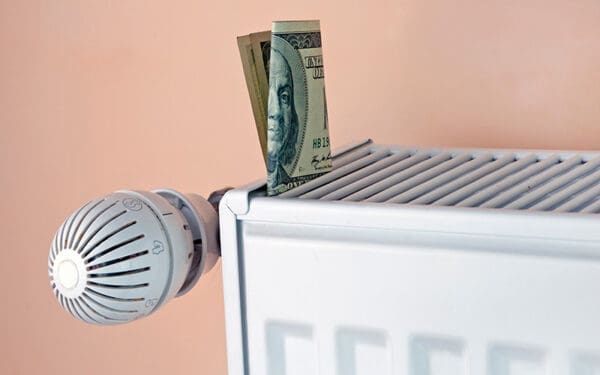
When it comes to carbon footprints, don't believe the hype.
Have you ever sat down to calculate your carbon footprint?
If you have, you’ll undoubtedly know that gut-wrenching feeling of tallying how much carbon you disgorge into the air daily through even your simplest actions. Think of commuting to work by car, eating meat, taking a plane, or even running a dishwasher. It all adds up to more carbon pollution in the air. And in the United States, that comes to about 15 tons per person, one of the highest rates in the world. (India, by contrast, is 1.89 tons per person).
It can certainly provoke a lot of guilt. It might also spur you to imagine how you could stop climate change by turning off that extra light.
Now, here’s something you may not know. The idea of a “carbon footprint” was developed by Ogilvy & Mather, a New York City-based British advertising and public relations firm working for British Petroleum, or BP, as they’re better known. Their idea was to rebrand the company in the age of global warming to “Beyond Petroleum.” It was an effort to reposition the company in an era in which climate change was increasingly accepted as scientific fact. As part of that rebranding, in 2004, the BP team brilliantly concocted the idea of a “carbon footprint,” which would lay the responsibility for climate change squarely on the shoulders of individuals. That’s right—you and me.
After all, we climb into our cars to get to work (although, in most cities and suburbs, there are few alternatives). We jet off to see family in distant cities (usually because there’s no train to get us there.) Plus, we throw mounds of wet laundry into a clothes dryer rather than line-drying. It’s all on us.
But it isn’t.
Carbon Footprint Facts: Throwing the Problem Back on Consumers
The truth is that most carbon pollution is emitted not by individuals like you and me but by industries and large-scale commercial enterprises. According to the Intergovernmental Panel on Climate Change (IPCC), just 100 companies emit 71% of climate-damaging carbon dioxide emissions worldwide.
In an interview with WBUR in Boston last year, Geoffrey Supran, director of the Climate Accountability Lab at the University of Miami and a professor of environmental science and policy, explained that the cynical ploy to blame individuals for carbon pollution fits into a public relations and litigation playbook that emphasizes consumer responsibility while downplaying corporate responsibility.
It’s happened with tobacco, junk food, lead, alcohol, and guns. He says recycling is one of the most famous examples of throwing the problem back at the consumer.
“It’s a well-trodden path that the oil industry and BP in particular have tapped into and applied to the climate crisis,” he said in that interview.
And they’re still at it. Just last month, an Exxon Mobil CEO told Fortune Magazine editors that the world had “waited too long” to invest in technologies to slow global warming. This comes after revelations that the fossil fuel industry knew of climate change as early as 1954 –but still kept pumping gas.
More than Just Our Individual Actions
Here’s the thing: Our overheated planet has resulted largely from wanton deception by fossil fuel companies fully aware of the damage their products were wreaking on the climate.
It might be nice to think walking or taking the bus instead of driving to work will help reverse climate change. But the truth is that fixing this problem involves governments, corporations, and institutions stepping up and taking responsibility for laws, policies, and infrastructure that will drastically reduce our society’s dependence on polluting fossil fuels.
Governments can do what individuals can’t: promote renewable energy, invest in sustainable infrastructure, and act as a watchdog to control pollution from major industries.
CLF fights for these changes because we recognize that climate change is caused by more than just one individual leaving the lights on in a room they’re not using. The real question is: Where is that electricity made? Does it come from clean wind and solar? Has society committed to clean, carbon-free infrastructure that requires an expanded electrical grid? Have governments created incentives to make it easier for businesses and consumers to adopt clean alternatives like electric cars, trucks, and heat pumps?
The oil and gas industry has paid millions in advertising dollars to foist the responsibility for our overheated planet on individuals rather than admit to its own greed. It has hampered efforts to turn climate change around. And it has encouraged people like you and me to feel overwhelmed and disempowered when we recognize, on some level, that line drying our laundry isn’t enough. But we need to stop feeling guilty and call them to account.
What’s A Carbon Footprint? Not as Personal as You Think
This is not to absolve individuals of all responsibility. Our actions can and do have a profound effect on our collective well-being. But we must take action beyond bringing reusable bags to the grocery store. We must hold our local, state, and federal representatives accountable for creating laws and policies that guard against corporate excess and malfeasance. Such policies decide the fate of our towns and neighborhoods, but they can also present opportunities to improve them. We must not let up. The companies responsible for climate change have lied about it and lobbied against climate action while making you and me the villains in the story.
It’s been a clever and successful ruse, so it’s essential not to forget the truth about carbon footprints – those footprints are made by entities with shoes far larger than our own.
This is one of an occasional series revealing the truth in environmental matters.



